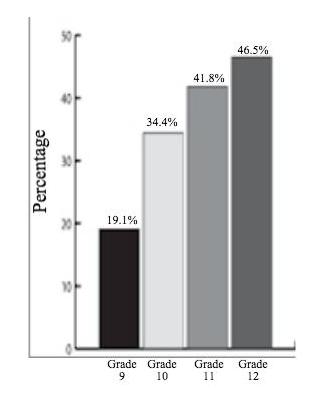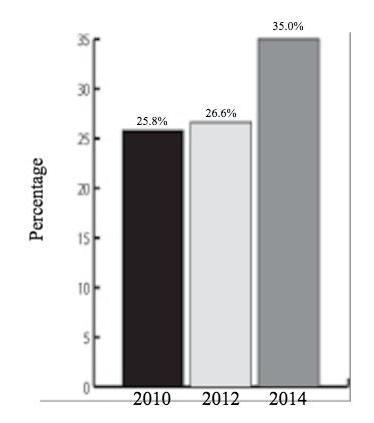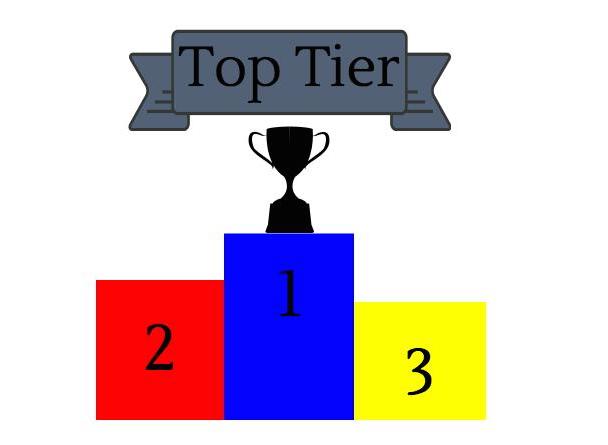Academic competition causes stress for many
December 10, 2015
School-inflicted stress is increasing, and many students and faculty members believe that academic competition, within the classroom and in the form of class ranks, is a major contributing factor.
According to the Metrowest Health Survey taken in 2014, 35.0 percent of Algonquin students considered life to have been “very” stressful within the past 30 days while in 2012 only 26.6 percent considered this to be true.

Percentage of ARHS students finding life “very” stressful by grade, according to the 2014 Metrowest Health Survey.
Several faculty members are concerned and hold the college admissions process accountable for the development of academic competition and the anxiety that competition creates.
“I think over the years there’s been a lot more push to go to college,” adjustment counselor Deborah Guterman said. “It’s almost like today, a bachelor’s degree is the equivalent of what a high school diploma was years ago. I think that that increases the competition of going to schools.”
“Students have developed a new sense of, ‘If I don’t get into a top tier school, then I won’t accomplish things in life,’” Director of Guidance Lisa Connery said. “So I think that the push of getting into a top tier school is maybe driving an increase in competitiveness and stress.”
Many students feel the pressures of getting into a competitive college and believe that class rank contributes to student competitiveness.
“In the back of my mind, I know that I’m going be ranked so I automatically compare myself to others,” sophomore Mikayla Fier said. “And I don’t think that the ranking system is fair. Just because I’m not taking two AP’s as a sophomore, I’m already so much lower than some people. Even though I could get all A’s in my honors classes, I’m already at such a disadvantage because the rank won’t necessarily reflect that I did as well as I could’ve possibly done in my classes.”
“I think that class rank is not that important because it’s just another value to estimate a person’s capabilities,” senior Sabrina Schick said. “I don’t think it’s necessary, and it’s just another way for students to get stressed out about academics when it’s little more than a number.”
Algonquin’s faculty has given a lot of thought to whether or not the school should continue with ranking. In fact, according to the College Board, less than 50 percent of American high schools still require their students to report class rankings to colleges, making it optional for students to report their class rank or having multiple valedictorians.
“I think that it’s a conversation we could continue to have,” Connery said. “It’s definitely worth [an] ongoing dialogue.”
Many believe another cause of the competitive school environment is the spotlight on grades.
“The way we train our kids to care about grades and the way we put together our achievement system, is a direct component of a larger problem of anxiety and stress among students,” social studies teacher John Barry said. “Even the kids who are doing well are going to bed with knots in their stomachs.”
Some teachers regularly post progress reports, which use student ID numbers to indicate which grade belongs to which student, on the wall. Several students appreciate the ability to stay updated in a way that allows them to compare their achievement with that of their peers. Others, however, feel as though public progress reports directly pin them against each other, and shift focus from learning to getting the best grade.
“I don’t like when my teacher posts the grades on the wall, because it could make me feel bad about my grades,” Albers said. “Even though I may be trying my best, my grade may still not be as high as someone else’s. I wouldn’t say the competition is motivating. I want to get good grades anyway, so I don’t like that it’s a competition to get the highest grades.”

Percentage of ARHS students finding life “very” stressful by year, according to the 2014 Metrowest Health Survey
Still, some faculty members believe that a certain degree of competition is simply part of life.
“I don’t think competition in school is inevitable,” Barry said. “I just think that [no competition in school] is going to require a lot of work that the current culture isn’t willing to undertake. In order to eliminate competition you’ve got to make sure that everybody is on board with a new paradigm. Algonquin is simply one of many competitive high schools that either can’t get out of their competitive ways or have chosen not to. When it starts to bleed into what I think it does bleed into, in which the competitiveness is at such a level that every single assessment is a referendum on your self worth as a student in that class, that’s dangerous.”
If students are dealing with any anxiety, school imposed or otherwise, counselors encourage them to seek out help from a trusted adult.
“Sometimes when students get anxiety, it’s very difficult to stop the cycle on their own,” Guterman said. “It would be helpful to start with maybe a parent or a guidance counselor, because they may need some help really taking a look at how much balance is in their life. It’s also about expectations. It’s great to be a high achiever, but it’s not a realistic thing to think that you can do everything to perfection.”
“Students should not just do things because other students are doing them and not just compete for the sake of competing,” Connery said. “It’s so important for them to understand that in life you have to stay true to yourself. Find what you’re good at, what you like doing, and pursue that.”










